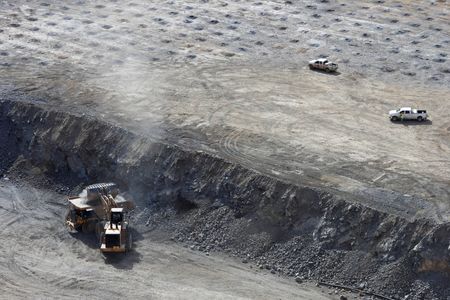By Amy Lv and Mai Nguyen
BEIJING/HANOI (Reuters) – Rare earth prices have likely bottomed out and are poised to rise later this year on demand from electric vehicles (EVs) and wind power and as dominant producer China is expected to pull back on expanding output quotas, analysts said.
Rare earths are a group of 17 elements used in products from lasers and military equipment to magnets found in EVs and consumer electronics. Prices surged to their highest in a decade in 2022 only to plunge last year on increased production in China and slower-than-expected demand growth crippled by the country’s patchy post-pandemic economic recovery.
The price in China of praseodymium oxide, one of the most widely used rare earth elements, fell 34% in 2023, while terbium oxide and neodymium oxide tumbled to their lowest levels since late 2020 last month, Shanghai Metals Market (SMM) data showed.
However, further downside for rare earths is likely to be limited as prices, particularly for neodymium-praseodymium (NdPr) oxide, used in permanent magnets, fell 38% last year and are near the production cost level, said SMM analyst Yang Jiawen.
NdPr oxide is likely to see an 800-metric-ton deficit globally in 2024, flipping from last year’s 6,600-ton surplus, Guolian Securities wrote last month.
“We expect extra supply to be more or less cleared by end-2024, as demand catches up with supply through continually increasing electric vehicle sales and wind turbine production,” said analyst Willis Thomas at CRU Group.
CHINA QUOTA
Last year, China issued a third batch of rare earth output quotas, the first time it issued a third set of quotas in a year since 2006, with the total quota for the year at a record high of 255,000 tons, up 21.4% from a year earlier.
However, China’s quotas are expected to increase at a slower rate this year, at between 10% to 15%, analysts at information provider Baiinfo said in a research note.
“We do expect another increase in production quota for both mining and separation … but not to the extent we have seen last year,” said analyst Ross Embleton at Wood Mackenzie.
China, which accounts for 70% of rare earths mining and 90% of refined output, according to the United States Geological Survey, has controlled its supply of the strategic resource through the quota system since 2006.
(Reporting by Amy Lv in Beijing and Mai Nguyen in Hanoi; Editing by Christian Schmollinger)

